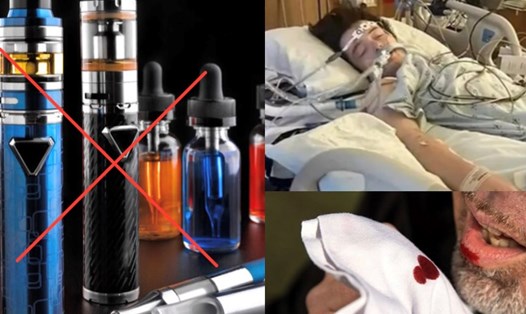A random sample study was conducted on 3,801 students from grades 6 to 12 in 11 provinces and cities during the period October-December 2023 supported by the Ministry of Health and Vital Strategies, a global public health organization.
The results showed that 96.2% and 37.8% of students were aware of the existence of e-cigarettes and heated tobacco products, respectively. Of these, 14% had tried e-cigarettes and 7% had used them in the past 30 days. The rate for heated tobacco products was 1.8% who had used them and 1% who were currently using them.
Professor Hoang Van Minh - Rector of the University of Public Health assessed that the level of use of electronic cigarettes and heated tobacco products among Vietnamese youth is at a high level, especially when compared with indicators of traditional cigarette use.
"This is a worrying trend, as it could reverse efforts to control tobacco use among adolescents that have been vigorously implemented over many years," emphasized Professor Hoang Van Minh.
In particular, high scores in both trial and current users of e-cigarettes and heated tobacco products may even lead to future increases in traditional cigarette use.
The nicotine addiction that develops during e-cigarette use can lead to a “transition” to traditional tobacco products.
Professor Hoang Van Minh said that immediate action is needed to develop and implement strict control policies for these products. Public health campaigns play a key role in addressing the lack of understanding about the harmful effects of e-cigarettes and heated tobacco products.
“In addition, public awareness campaigns can create a strong wave of support for tobacco control policies, moving away from the idea that smoking is ‘cool’ or masculine for young people,” he said.
Not only in Vietnam, the rate of young people using new tobacco products has also increased rapidly in many countries over the past 10 years.
The appeal of e-cigarettes and heated tobacco devices with their trendy designs, diverse flavors and sophisticated advertising campaigns has led many people, especially teenagers, to mistakenly believe that these products are safer than traditional cigarettes.
According to Associate Professor Becky Freeman, an expert from the School of Public Health, University of Sydney (Australia), tobacco companies are using sophisticated advertising tactics to attract young people, especially through social networks.
They create attractive images, use celebrities to promote their products, and spread misinformation about the safety of e-cigarettes and heated tobacco products.
Sharing this view, Ms. Bungon Ritthiphakdee, Executive Director of the Global Governance and Tobacco Control Center (GGTC, Thailand) commented that the tobacco industry is trying to avoid management regulations by introducing new products such as e-cigarettes and heated tobacco products, to cope with increasingly strict regulations on traditional cigarettes.
“E-cigarettes and heated tobacco products also contain addictive nicotine, potentially creating a new generation of nicotine addicts,” warned experts from the Center for Global Tobacco Management and Control.
It is known that currently in the world, there are at least 34 countries and territories that have completely banned e-cigarette products, and 11 countries have banned the sale of heated tobacco products.
Typically, in Singapore, since February 2018, the government has completely banned the purchase, use and possession of tobacco products such as e-cigarettes, shisha and smokeless tobacco.









